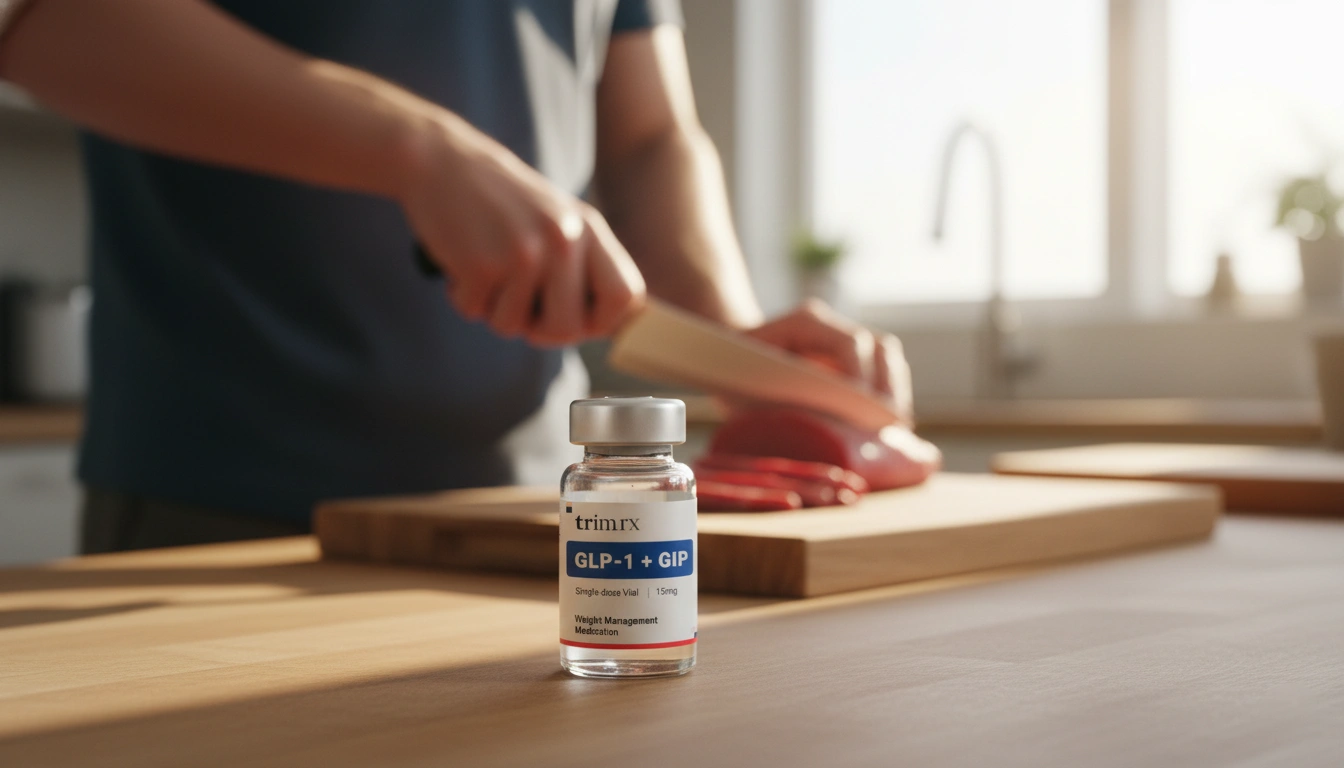How to Prevent Pancreatitis on GLP-1: Essential Insights for Safe Weight Loss

Acute pancreatitis, characterized by sudden inflammation of the pancreas, is a serious condition that can lead to significant health complications. Recent studies have highlighted a potential association between GLP-1 receptor agonists (GLP-1 RAs)—a class of medications increasingly used for weight management—and the risk of developing pancreatitis. This connection raises critical questions for individuals considering or currently using GLP-1 medications for weight loss. What can we do to minimize the risk of pancreatitis while benefiting from these innovative treatments?
At TrimRx, our mission is to empower individuals on their weight loss journeys through personalized, medically supervised care. Our approach combines cutting-edge telehealth innovations with safe and effective weight loss solutions. In this blog post, we will explore how to prevent pancreatitis when using GLP-1 medications, emphasizing our commitment to transparency, safety, and individualized care.
Introduction
Did you know that a significant percentage of patients using GLP-1 medications for weight loss may unknowingly be at risk of developing acute pancreatitis? This alarming reality underscores the necessity for awareness and proactive measures when engaging with these medications. As GLP-1 receptor agonists gain popularity due to their effectiveness in promoting weight loss and managing type 2 diabetes, understanding how to mitigate the associated risks becomes paramount.
In this post, we will provide a comprehensive overview of what pancreatitis is, the relationship between GLP-1 medications and pancreatitis, and essential strategies for prevention. We’ll delve into the risk factors associated with pancreatitis, the importance of individualized assessments, and how TrimRx’s personalized programs can help you navigate this landscape safely. By the end of this article, you will be equipped with practical knowledge to help you make informed decisions about your weight loss journey while prioritizing your health.
Together, we will explore the crucial aspects of managing weight loss with GLP-1 medications, ensuring that you feel supported and empowered every step of the way.
Understanding Pancreatitis
What is Pancreatitis?
Pancreatitis occurs when the pancreas becomes inflamed, leading to severe abdominal pain and a range of digestive issues. It can be classified into two main forms: acute and chronic. Acute pancreatitis is a sudden onset condition that can be life-threatening, while chronic pancreatitis develops over time and can lead to permanent damage to the pancreas.
Symptoms of Acute Pancreatitis
The symptoms of acute pancreatitis can vary in intensity but often include:
- Severe abdominal pain, particularly in the upper abdomen
- Nausea and vomiting
- Fever
- Increased heart rate
- Swollen or tender abdomen
If you experience these symptoms, it is vital to seek medical attention promptly.
Risk Factors for Pancreatitis
Several factors can increase the likelihood of developing pancreatitis. Understanding these risk factors is essential for individuals considering GLP-1 medications for weight loss. Key risk factors include:
- History of Gallstones: These can obstruct the pancreatic duct, leading to inflammation.
- Chronic and Heavy Alcohol Use: Alcohol can cause inflammation of the pancreas.
- Certain Medications: Some medications, including certain diuretics and medications for high blood pressure, have been associated with pancreatitis.
- Obesity and Metabolic Disorders: Obesity itself is a significant risk factor for pancreatitis.
Interestingly, recent research has indicated that GLP-1 medications, while effective for weight loss, may carry an associated risk of pancreatitis, particularly in certain populations. Understanding this relationship is critical for anyone considering these medications.
The Connection Between GLP-1 Medications and Pancreatitis
What Are GLP-1 Medications?
GLP-1 receptor agonists are a class of medications that mimic the action of the glucagon-like peptide-1 hormone, which plays a role in regulating appetite and glucose levels. These medications have gained traction for their effectiveness in weight loss and management of type 2 diabetes. Some commonly prescribed GLP-1 medications include:
- Semaglutide (e.g., Ozempic®)
- Tirzepatide (e.g., Mounjaro®)
- Liraglutide (e.g., Saxenda®)
While these medications have demonstrated significant benefits for weight loss, research indicates that they may also be associated with an increased risk of acute pancreatitis.
Research Findings on GLP-1 and Pancreatitis Risk
Recent studies have highlighted various factors that may influence the risk of pancreatitis with GLP-1 medications. For instance, a study presented at the American College of Gastroenterology’s Annual Scientific Meeting noted that patients with a history of type 2 diabetes, tobacco use, and advanced chronic kidney disease were at a higher risk for developing acute pancreatitis after starting GLP-1 therapy. Interestingly, a higher body mass index (BMI) appeared to have a protective effect against pancreatitis in some cases.
Furthermore, another study revealed that individuals taking GLP-1 medications showed a lower risk of pancreatitis recurrence compared to those on other diabetes medications. This nuanced relationship highlights the importance of assessing individual risk factors when considering GLP-1 medications.
Why Understanding This Connection Matters
As the use of GLP-1 medications grows, it is crucial for patients and healthcare providers to be aware of the potential risks. By understanding the factors that contribute to pancreatitis risk, individuals can take proactive steps to mitigate these risks while benefiting from the medications’ weight loss effects.
Strategies to Prevent Pancreatitis on GLP-1 Medications
1. Personalized Assessment
At TrimRx, we believe that every individual’s health journey is unique. Before starting any medication, we encourage potential patients to complete our free assessment quiz. This quiz helps determine eligibility for our personalized weight loss programs, enabling us to tailor a treatment plan that aligns with your specific health profile.
By understanding your medical history, including any risk factors for pancreatitis, we can develop a strategy that prioritizes your safety while helping you achieve your weight loss goals.
Take our free assessment quiz today to see if you qualify for our prescription weight loss medications: Take the Quiz.
2. Regular Monitoring and Follow-up
For individuals using GLP-1 medications, regular follow-ups with healthcare professionals are essential. Monitoring your health and any potential symptoms associated with pancreatitis can help ensure early detection and intervention if necessary.
At TrimRx, we provide ongoing support and access to healthcare professionals who can address your concerns and adjust your treatment plan as needed. This commitment to comprehensive care is a cornerstone of our approach.
3. Lifestyle Modifications
Adopting healthy lifestyle changes can significantly reduce the risk of pancreatitis:
- Balanced Diet: Focus on a diet rich in fruits, vegetables, whole grains, lean proteins, and healthy fats. Avoid high-fat and processed foods that may exacerbate digestive issues.
- Hydration: Staying well-hydrated is vital for pancreatic health. Aim for adequate water intake throughout the day.
- Limit Alcohol Consumption: If you consume alcohol, do so in moderation. Excessive alcohol use is a known risk factor for pancreatitis.
- Quit Smoking: Smoking is associated with increased pancreatitis risk. Seeking support to quit smoking can greatly benefit your overall health.
4. Awareness of Symptoms
Being aware of the symptoms of acute pancreatitis is crucial for anyone using GLP-1 medications. If you experience severe abdominal pain, nausea, or vomiting, contact a healthcare professional immediately. Early detection can lead to better outcomes.
5. Collaborating with Healthcare Providers
Partnering with healthcare providers who understand your unique situation and medical history is essential. At TrimRx, we prioritize transparent communication and encourage you to discuss any concerns or questions regarding GLP-1 medications and their potential risks.
The Role of TrimRx in Your Weight Loss Journey
Personalized Weight Loss Programs
At TrimRx, our journey began with a shared vision to help individuals embrace healthier lifestyles through personalized care and cutting-edge telehealth innovations. Our weight loss programs combine medically supervised treatment with compassionate support, ensuring that you feel empowered throughout your journey.
Our offerings include a range of prescription medications, such as Compounded Semaglutide, Oral Semaglutide, Ozempic®, Compounded Tirzepatide, Oral Tirzepatide, Mounjaro®, Zepbound®, and Wegovy®. Each of these medications is provided through FDA-registered and inspected pharmacies, ensuring safety and quality.
Comprehensive Support
Our commitment to your success goes beyond medications. We offer comprehensive services, including doctor consultations, lab work, unlimited support, and convenient shipping. Our team is dedicated to providing transparent guidance, ensuring there are no hidden fees along the way.
If you’re seeking immediate support in your weight loss journey, consider our quick-access supplements, such as:
- GLP-1 Daily Support: A supplement designed to complement your weight loss efforts. Learn More.
- Weight Loss Boost: A quick-access supplement to support your overall wellness. Shop Now.
Conclusion
As we have explored throughout this post, understanding how to prevent pancreatitis on GLP-1 medications is essential for anyone considering or currently using these treatments for weight loss. By being aware of the risk factors, engaging in personalized assessments, and adopting healthy lifestyle changes, you can effectively mitigate the risks while reaping the benefits of GLP-1 medications.
At TrimRx, our commitment to your health and well-being is unwavering. Together, we can navigate the complexities of weight loss and health management, ensuring that you feel supported and empowered on your journey.
If you’re ready to take the next step toward a healthier lifestyle, we invite you to take our free assessment quiz and discover how our personalized weight loss programs can help you achieve your goals: Take the Quiz.
FAQ
What is pancreatitis, and how does it affect the body?
Pancreatitis is the inflammation of the pancreas, which can lead to severe abdominal pain and digestive issues. It can be acute (sudden onset) or chronic (developing over time), and it may result in serious complications if not addressed promptly.
Are GLP-1 medications safe for everyone?
While GLP-1 medications have shown effectiveness in weight loss and managing type 2 diabetes, they may not be suitable for everyone. Individuals with specific risk factors, such as a history of pancreatitis or certain medical conditions, should discuss their options with a healthcare provider.
How can I minimize my risk of pancreatitis while using GLP-1 medications?
To minimize the risk of pancreatitis, consider personalized assessments, engage in regular monitoring with healthcare providers, adopt a balanced diet, stay hydrated, limit alcohol consumption, and be aware of any symptoms associated with pancreatitis.
What should I do if I experience symptoms of acute pancreatitis while on GLP-1 medications?
If you experience severe abdominal pain, nausea, or vomiting while taking GLP-1 medications, seek medical attention immediately. Early detection and intervention can lead to better outcomes.
How can TrimRx support my weight loss journey?
At TrimRx, we offer personalized weight loss programs, prescription medications, and comprehensive support to ensure your journey is safe, effective, and tailored to your unique needs. Our commitment to transparent care means you will always know what to expect along the way.

Transforming Lives, One Step at a Time
Keep reading
China’s Supreme Court Upholds Semaglutide Patent for Novo Nordisk
China’s Supreme People’s Court upholds Novo Nordisk’s semaglutide compound patent, supporting IP protection.
Over 600,000 Californians Risk Losing Access to GLP-1 Weight-Loss Drugs
California’s Medi-Cal will stop covering GLP-1 weight-loss drugs for weight-loss-only prescriptions, effective Jan. 1, 2026.
Weight-Loss Pill Approval Likely to Prompt Overhaul of Packaged Food and Fast-Food Products
FDA approval of GLP-1 weight-loss pills may prompt food makers and restaurants to shift to high-protein, smaller-portion products.



